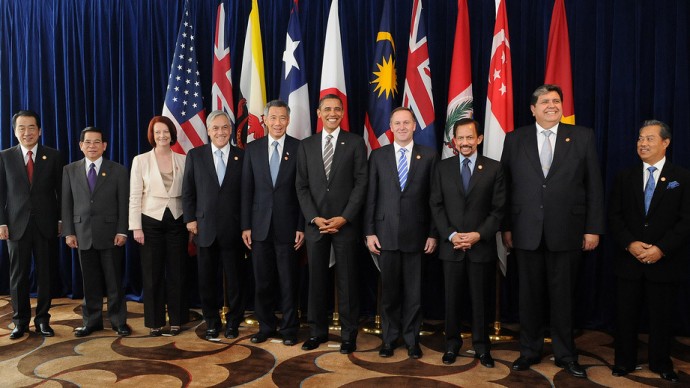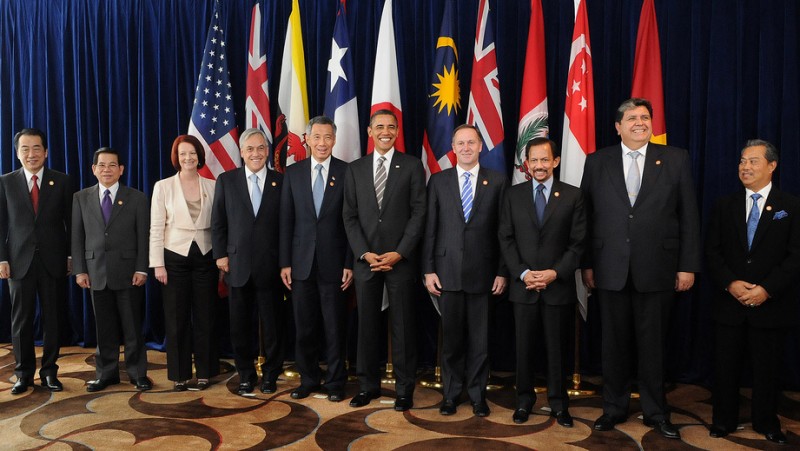
(MintPress) — Documents obtained by activist organization Citizens Trade Campaign (CTC) contain information revealing a proposal by the Trans-Pacific Partnership (TPP) that would provide legal avenues for multinational corporations to challenge laws and regulations in foreign countries — one that would bypass the domestic legal system, diverting the case to an international tribunal.
It’s a plan that could theoretically allow multinational corporations to operate outside of laws within other TPP countries — Australia, New Zealand, Singapore, Vietnam, Brunei, Malaysia and the U.S. — with the potential to violate environmental and workers’ regulations. CTC also highlights the fact that foreign countries could seek compensation from the U.S. for costs associated with complying to the country’s legal standards.
“Via closed-door negotiations, U.S. officials are rewriting swaths of U.S. law that have nothing to do with trade and in a move that will infuriate the left and right alike have agreed to submit the U.S. government to the jurisdiction of foreign tribunals that can order unlimited payments of our tax dollars to foreign corporations that don’t want to comply with the same laws our domestic firms do,” Citizens Global Trade Watch Director Lori Wallach said in a press release.
TPP documents released through CTC indicate foreign countries operating within the United States would be given the same privileges, potentially leading to an outside corporation challenging U.S. law — and winning, therefore operating on a different set of regulations offered to an American business.
“We are just beginning to analyze the new texts now, but they clearly contain proposals designed to give transnational corporations special rights that go far beyond those possessed by domestic businesses and American citizens,” CTC Executive Director Arthur Stamoulis said in a press release.
In a statement provided to MintPress, U.S. Trade Representative Spokeswoman Nkenge Harmon said the agreement will not mean a rollback in domestic legal issues, saying the the Obama Administration is committed to ensuring strong public health, environmental and safety laws.
“Nothing in our TPP investment proposal could impair our government’s ability to pursue legitimate, non-discriminatory public interest regulation, including measures to protect public health, public safety, and the environment,” Harmon stated.
Speaking in terms of U.S. corporations operating abroad, Harmon said it’s the job of the TPP investment sector to be sure that companies will be held to standards similar to those seen domestically, while at the same time ensuring TPP foreign investors in the U.S. are not awarded rights that exceed U.S. companies. For U.S. companies operating in TPP countries, that could mean protection from unlawful expropriation and discrimination, while providing access to “neutral, effective dispute settlement procedures.”
Harmon did not comment on to the authenticity of leaked documents.
“ … It is our policy not to comment about the authenticity of documents purported to be ‘leaked text,’” she stated.
An argument for transparency
The battle for the release of TPP-related documents did not begin with Citizens Trade’s recently leaked content — an act the organization claims was a last resort for obtaining information formally requested.
In May, Citizens Trade presented a petition to U.S. Trade Representative Ron Kirk, one which contained 42,000 signatures requesting that documents related to the TPP and its negotiations be released. It was an appeal not addressed by Kirk or the World Trade Organization (WTO).
“Americans deserve the right to know what U.S. negotiators are proposing in our names,” Stamoulis said in a press release. “In the absence of transparency on the part of our government, we have a responsibility to share what information we receive about the TPP with the public.”
But the USTR argues that transparency was considered at every step of the way, generating a negotiation process with unprecedented open access.
“We have worked with Members of Congress, traveled across the country to meet with stakeholders, invited stakeholders to every round of negotiations where they have given presentations and met with individual negotiation teams,” she stated. “We continue to do this outreach, including at the upcoming TPP negotiating round in San Diego next month.”
A TPP conference is scheduled July 2-10 in California — one which will allow stakeholders to discuss with negotiators and question proposed policies. Members of the press are invited to register for press credentials.
But Citizens Trade isn’t convinced that such transparency efforts are unprecedented, citing the fact that the WTO publishes texts regarding trade agreement negotiations on its website. In 2011, Citizens Trade argued in a press release that the WTO released a full draft of the Free Trade Area of the Americas (FTAA). The organization also takes issue that meetings regarding the actual drafting of the documents have taken place behind closed doors.
The leaked documents, following a May Reuters report, in which it was stated that proposed member countries hope to create a pact through TPP that will go above and beyond former pacts among the countries that focussed on improving environmental and workers’ rights. At that time, the documents, however, were not being released to the public.
“A proposal that could have such broad effects on environmental, consumer safety and other public interest regulations deserves public scrutiny and thorough public debate,” Stamoulis said. “It shouldn’t be crafted behind closed doors.”


